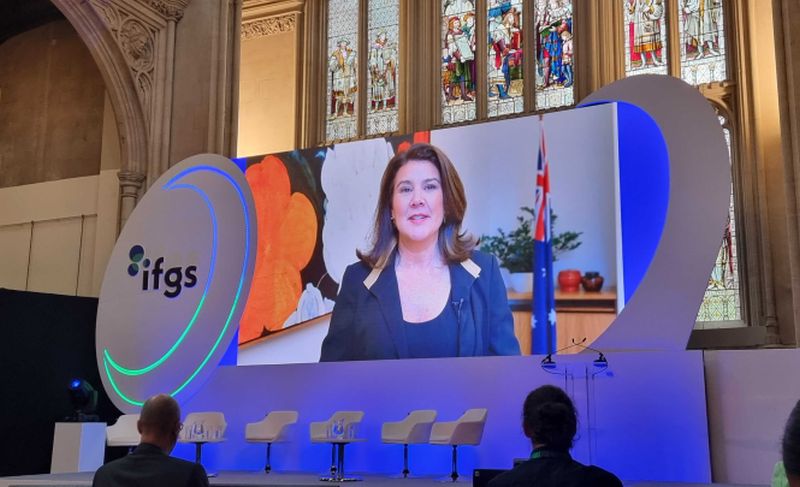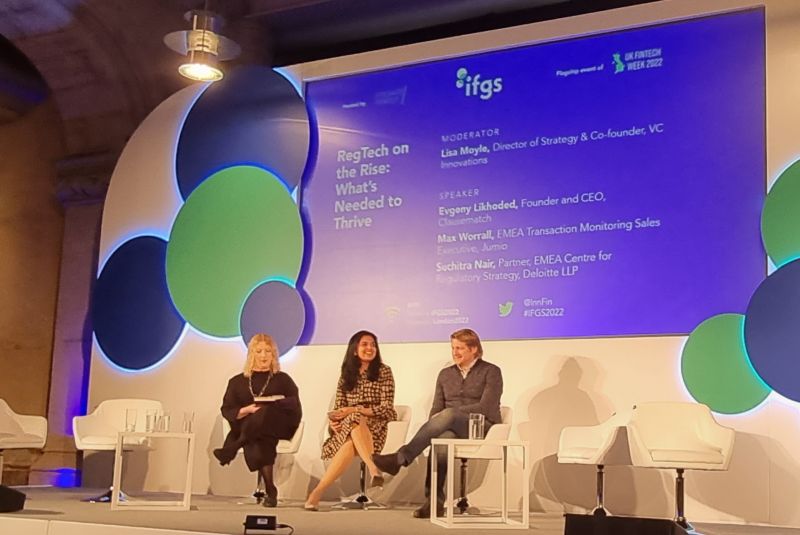Innovate Finance Global Summit (IFGS 2022) has shone a light on the global fintech ecosystem with politicians, startups, founders, bankers, investors, regulators and academics from around the world coming together to discuss and debate industry trends and legislative developments, as well as future opportunities and challenges.
The two-day event at the City of London’s 600-year-old Guildhall attracted 1,500 in-person attendees, including The Fintech Times (TFT) team, plus 500 people on its live stream.
Speakers and panellists delved into how we can ensure financial services are relevant, sustainable, simple and inclusive for all in scores of insightful in-depth sessions held in the Grade II-listed Old Library and Livery Hall. Innovators showed off their latest technology in The Tech Tunnel located in the Crypt. While movers and shakers in the fintech world, including Mambu, TrueLayer, Airwallex and Wise, mingled in the exhibitor section in the Great Hall.

TFT and The Fintech Power 50 also had the pleasure of catching up with some amazing guests for some exclusive video interviews that will be shared very soon – so keep an eye on our social channels.
First, following an insightful couple of days at UK Fintech Week’s flagship event, let’s pick out just a few highlights from IFGS2022.
Day One Morning
The morning kicked off with a welcome speech from Catherine McGuinness, policy chair at City of London Corporation, reflecting on the “UK’s burgeoning tech expertise” and how important fintech is as an “increasingly vital part of our innovative financial ecosytem”. While, Janine Hirt, CEO of Innovate Finance, promised “a Summit and UK Fintech Week to remember”.
In the Old Library, the role of London and the wider UK as a global powerhouse continued with Sarah Williams-Gardener, CEO at FinTech Wales, highlighting the “importance of collaboration for greater good” and “working as Team GB in order to ensure the UK stays at the top globally”.
While focus in Livery Hall turned to embedded finance – a sector that is predicted to be worth $3.6trillion by 2030. Moderator Eleni Digalaki, principal analyst of Insider Intelligence described it as “the hottest topic in the industry right now”. A view echoed by Lord Chris Holmes of Richmond MBE who added: “Embedded finance is the transformative force in 2022 and beyond, enabling people to have what they want in a frictionless, seamless, connective way.”
Day One Afternoon

After lunch, John Glen MP, the Economic Secretary to the Treasury, took to the stage to outline the UK’s vision for being a global hub for cryptoasset technology in a keynote speech. He also explained how the government will explore the potentially transformative benefits of distributed ledger technology (DLT) in UK financial markets.
He said: “We want this country to be a global hub – the very best place in the world to start and scale crypto-companies. If there is one message I want you to leave here today with, it is that the UK is open for business – open for crypto businesses. Our view is that crypto is going to impact many different sectors – including financial services. Change is going to be dynamic… which means that the way we regulate crypto-technologies needs to be dynamic too.
“Finally, I am announcing today that the Chancellor has asked the Royal Mint to create a non-fungible token – an NFT… to be issued by the Summer, an emblem of the forward-looking approach we are determined to take.”
Meanwhile, in the Old Library a panel discussed ways existing fintech innovation can contribute to a more sustainable future. Emma Kisby, UK and Europe CEO at CoGo, suggested: “We need to take the friction out of the idea that it’s hard to be sustainable or carbon conscious. We need to make it very easy by presenting information in a transparent and clear way.”
Day Two Morning
The Summit’s second day started with a cheery welcome address from Senator Jane Hume live from Australia who discussed the importance of trade between UK and Australia to strengthen the ‘Fintech Bridge’ between both nations.

She commented that: “Australia has one of the most dynamic fintech marketplaces in the world, supported by a deep and broad financial services sector, a fast growing domestic fintech sector, and a regulatory environment that encourages innovation.”
The rise of fintech in Australia featured heavily throughout the Summit with High Commissioner for Australia George Brandis in attendance as well as the Australian Trade and Investment Commission (Austrade) team and 10 Australian leading fintechs.
The CEO of data and intelligence platform Moneyhub, Australian Sam Seaton (who has lived in the UK since the mid-1990s), highlighted how ‘like with cricket’ Australians are taking what we’ve done with fintech but look to be ‘doing it a bit better’. She quipped during a panel on open finance: “We can’t let the Australians catch up or I’ll have to go back home!”
Meanwhile, Professor Cathy Mulligan drew a ripple of applause during a panel in Livery Hall on digital assets. Her comments that “we should use these digital assets to overthrow the World Bank and empower people around the world. Don’t just think of it as money think about it as a way to challenge money and its use around the world, supporting SDGs” going down a storm.
Day Two Afternoon
Food for thought came from Julia Hoggett, CEO of LSE, during a fireside chat with Philippa Martinell, as she reminded delegates why it’s so important to embrace diversity and differences. She commented: “In the UK, we create some absolutely superb technology and fintech companies but we should never rest on our laurels.
“We need to create an environment that makes it possible for younger people, people earlier in their careers, to sit on boards and get that experience. We have to celebrate that diversity and difference. For anyone who wants to have a voice in shaping UK capital markets, we will always be an open door.”
Sessions in the afternoon also put the spotlight on regulation, addressing how financial institutions can address regulatory and cultural barriers, and increase regtech adoption.
Anthony Eisen, co-founder of Afterpay, stressed the importance of regulation during a virtual fireside chat. He said: “A new sector that involves millions of consumers should justifably be regulated, hopefully within the confines of a system where you know you have to do the right thing”.
While speaking on the panel ‘Regulating Innovation: When things start heating up’, Francesca Porter, general counsel at Onfido, outlined how different systems internationally can impact operational factors.
She said: “Trying to comply with all these different regimes when you actually have data flows going all over the world, possibly to support global businesses means that sometimes you have to build out your entire data infrastructure in two different places, as well as having those teams doing the same thing.”
Evgeny Likhoded, founder and CEO of Clausematch, also suggested that one of the biggest impacts will be the “digitisation of regulatory change” with the headache of hundreds of regulatory frameworks from more than 1,000 regulators globally.

There’s still plenty more for us to look back on from IFGS2022 but for now, we’ll take a breath, and say: ‘See you at IFGS2023!’.




